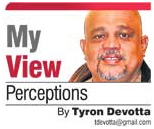2024 (not 2012) will be the end of mankind... What I really mean is that it may well spell the end of male dominance. The thought might be scary for men but a Newsweek article on the net titled `Richer Sex'(11 June 2010) is predicting that "the average woman will make more than the average man by 2024." You may well exclaim "Whaaat???"
Is this going to be only in the USA or all over the world? Isn't the male the stronger sex, the breadwinner, the head of the family, and the one who dominates the world of commerce, etc., etc.? Am I sounding like a male chauvinist now?
On a more serious note, it looks like the equation has been changing for a while now. The trend appears to be tipping towards woman-power and us males are going to be less productive (at least on the bread winning front) - thus the end of male dominance.
Newsweek says: "Even before the financial crisis, the spending power of women was increasing in both rich and poor countries. The downturn has accelerated the trend, particularly in the United States. American men lost more jobs (they worked in the hardest-hit areas like financial services and manufacturing), whereas women started more companies. The pay gap has also continued to decrease. In 35 per cent of double-income households in the United States, wives now make more than their husbands, up from 28 per cent five years ago. Assuming the trend continues, the average woman will make more than the average man by 2024."
This changing trend is also seen in Sri Lanka. Apart from many busiatess leaders being women, even amongst the rural communiti4 women have taken on a stronger role by getting employment overseas and in the local garment industry. With such ent, the Dun cnasing power of wonien as increased all over the world both in rich as well as poor countries. Women have become decision-makers to contend with.
One of the companies which cottoned onto this fairly early was Apple' which, according to Michael J. Silverstein, a partner at Boston Consulting Group (BCG) "is the only company in the technology arena making any money". He says that they make things that are beautiful for which a lot more can be charged and according to the Group's research, Apple is the most favoured brand across all product categories for women.
Another company which has been quick to follow suit is Hewlett-Packard (HP). The company, which used to employ just a few female product designers previously, now employs a 50-50 ratio of female to male product designers.
They focus much more on female oriented products, a direct result being their all new sensually appealing "digital clutch" laptops. Giving serious competition to Apple laptops, the digital clutches are exquisitely designed: looking more like beautiful makeup cases, with their stylish, piano-like keyboards, rather than a laptop. Exactly what would appeal to a woman.
However, research also shows that although women are the majority decision-makers in several important areas, apart from the obviously female oriented sectors like food, packed goods and apparel which do a decent job in catering to women; there are still many industries such as cars, travel, health care, and consumer electronics which do not take women into account in their product development and marketing.
According to Maddy Dychtwald, author of 'Influence,' a book on female economic power: "A lot of the people making these decisions at top firms are still older men" (Newsweek).
For example, the healthcare sector may say that they cater to women with their 'well women' health packages. But women's needs are much more varied than what these packages would cover; for instance rooms and floors dedicated to women with amenities, fittings and even colour schemes that would appeal. Hospitals would be able to market special facilities to their female clients if they focussed on developing a target specific product. The same goes for the hospitality, entertainment and a score of other industries.
The trend is already set and it is a given that the woman of today is poised to spend on much more than merely fashion and the question is... is the market geared for it?
(The writer, a PR consultant ant head of Media360, was previously a mainstream journalist in print and electronic media. He also edits a new media website.)




